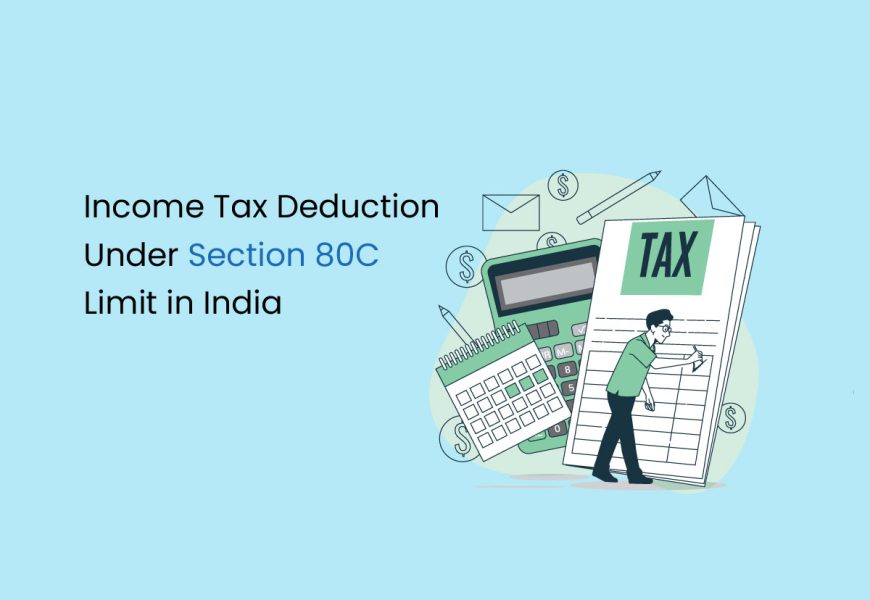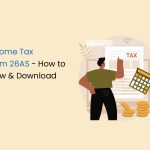Section 80C is an opportunity for individual taxpayers and Hindu Undivided Families (HUFs) seeking to optimise their tax liabilities while building a secure financial future. Understanding the nuances of this section is pivotal for every taxpayer, as it opens the door to substantial tax savings through a diverse range of investments and expenditures.
In this extensive article, we delve deep into Section 80C of the Income Tax Act, talking about its provisions and shedding light on the various avenues it offers for tax exemptions.
What is Section 80C?
Section 80C of the Income Tax Act in India denotes specific expenditures and investments/ contributions that are eligible for income tax. It permits individual taxpayers and Hindu Undivided Families (HUFs) to claim a maximum deduction of up to Rs 1.5 lakh annually from their gross total income. This provision offers significant tax relief by allowing eligible individuals and HUFs to reduce their gross total income by investing in specified financial instruments and expenditures. Notably, these tax exemptions do not apply to corporate bodies, partnership firms, or other business entities.
Investments Eligible for Deduction Under Section 80C
Taxpayers find comfort in Section 80C of the Income Tax Act as it allows individuals and families to save money on their taxes by investing in specific options and making eligible expenses. This section is beneficial for Individuals and Hindu Undivided Families (HUFs) in India, offering a maximum deduction of Rs 1.5 lakh annually from their total income. It’s important to note that this deduction is not applicable to Companies, partnership firms, and Limited Liability Partnerships (LLPs).
In simpler terms, Section 80C enables individual taxpayers and HUFs to lower their gross total income by up to Rs 1.5 lakh each year. This deduction covers a wide array of investments and expenditures, providing taxpayers with the flexibility to choose options that align with their financial goals and risk appetite.
It’s worth mentioning that the maximum deduction under Section 80C, 80CCC, and 80CCD (1) combined is limited to Rs 1.5 lakhs. However, there’s an opportunity for an additional deduction of Rs 50,000 allowed under section 80CCD(1B). This additional benefit allows taxpayers to optimise their tax planning further.
The table below details the various investment options eligible for deduction under Section 80C of the Income Tax Act in India. Each option comes with its respective interest rate, minimum lock-in period, assured return status, and associated risk level. Understanding these factors is essential for individuals making informed decisions about their tax-saving investments.
| Investment Options | Interest Rate | Minimum Lock-in Period | Assured Return | Associated Risk |
|---|---|---|---|---|
| ELSS | 12% to 15% | 3 years | No | High |
| NPS | 8% to 10% | Till the investor reaches 60 years of age (retirement) | No | High |
| SCSS | 8.20% | 5 years | Yes | Low |
| PPF | 7.10% | 15 years | Yes | Low |
| NSC | 7.7% | 5 years | Yes | Low |
| ULIP | 8% to 10% | 5 years | No | Moderate |
| Fixed Deposit | Up to 8.40% | 5 years | Yes | Low |
| Sukanya Samriddhi Yojana | 8.00% | The account matures after 21 years from the date of opening or upon the girl’s marriage after the age of 18. | Yes | Low |
Limit on deductions under section 80C, 80CCC, 80CCD(1), 80CCE, 80CCD(1B)
The table below outlines various sections of the Income Tax Act in India, detailing the eligible investments for tax deductions and their respective maximum deduction limits. Understanding these sections is essential for taxpayers to optimise their tax planning effectively.
| Sections | Eligible Investments for Tax Deductions | Maximum Deduction |
|---|---|---|
| 80C | Contribution to Unit-linked Insurance plan, Premium paid in respect of life insurance policy, Contribution to PPF, SPF/RPF, Approved superannuation fund, Sukanya Samriddhi Account, Mutual fund or UTI [ELSS] and Tuition fees to any university, college, school | Rs 1,50,000 |
| 80CCC | Contribution to certain pension funds | Rs 1,50,000 |
| 80CCD(1) | Payments made towards the Atal Pension Yojana or other notified pension schemes | Employed: 10% of basic salary + DA
Self-employed: 20% of gross total income |
| 80CCE | Total deduction under Sections 80C, 80CCC, 80CCD(1) | Rs 1,50,000 |
| 80CCD(1B) | Investments in NPS (outside the Rs 1,50,000 limit under Section 80CCE) | Rs 50,000 |
| 80CCD(2) | Employer’s contribution towards NPS (outside the Rs 1,50,000 limit under Section 80CCE) | Central government employer: 14% of basic salary + DA
Others: 10% of basic salary + DA |
Eligibility Criteria for Section 80C
Section 80C of the Income Tax Act extends its benefits to Individuals and Hindu Undivided Families (HUFs) residing in India. Notably, this section is not limited to Indian residents alone; it also encompasses non-resident Indians (NRIs) who can avail of deductions under this provision.
However, it’s important to understand that the benefits of Section 80C are exclusive to individuals and HUFs. Corporate entities such as companies, partnerships, and other corporate bodies are not eligible to claim deductions under this section. This eligibility criterion ensures that individual taxpayers and HUFs can utilise the tax-saving opportunities provided by Section 80C to reduce their gross total income effectively.
Tax-Saving Investments
Section 80C of the Income Tax Act in India offers many investment options that provide tax benefits up to a maximum limit of Rs. 1.5 lakh annually. Here’s a detailed overview of the eligible investments under Section 80C:
Life Insurance Premiums
Life insurance premiums paid for policies held by the individual, spouse, children, and Hindu Undivided Family (HUF) members are eligible for deductions under Section 80C. Initially, premiums up to 20% of the sum assured were eligible for tax exemption. However, after April 1, 2012, this limit was revised to 10% of the sum assured for policies issued after that date.
Public Provident Fund (PPF)
Contributions made to the Public Provident Fund qualify for tax deductions. The PPF has a maximum deposit limit of Rs. 1.5 lakh per financial year, and the entire deposited amount is exempt from tax under Section 80C.
NABARD Rural Bonds
Investments made in Rural Bonds issued by the National Bank for Agriculture and Rural Development (NABARD) are eligible for deductions under Section 80C. The maximum deductible amount is capped at Rs. 1.5 lakh.
Unit Linked Insurance Plans (ULIPs)
ULIPs, which combine insurance and investment, offer tax exemptions up to Rs. 1.5 lakh under Section 80C. Unlike traditional insurance policies, ULIP returns are market-linked and do not guarantee fixed returns.
National Savings Certificate (NSC)
Investments made in National Savings Certificates qualify for deductions. NSC interest is compounded semi-annually, and the maximum maturity period ranges from 5 to 10 years.
Tax Saving Fixed Deposits
Fixed deposits with a minimum lock-in period of 5 years are eligible for tax benefits under Section 80C. The principal amount invested (up to Rs. 1.5 lakh) is deductible from gross total income.
Employee Provident Fund (EPF)
Contributions made towards the Employee Provident Fund are eligible for tax exemptions under Section 80C. However, if the EPF amount is withdrawn before five years, it might be taxable in certain cases.
Infrastructure Bonds
Investments in specific infrastructure bonds, equal to or exceeding Rs. 20,000, are eligible for tax exemptions. The overall deduction limit under Section 80C remains Rs. 1.5 lakh for these long-term secured bonds.
Equity-Linked Saving Schemes (ELSS)
ELSS investments, which are equity-oriented mutual funds, offer tax benefits under Section 80C. These investments come with a mandatory lock-in period of 3 years and provide full exemption up to Rs. 1.5 lakh.
Senior Citizens Savings Scheme (SCSS)
SCSS is eligible for tax exemption up to Rs. 1.5 lakh under Section 80C. Individuals above the age of 60 years (or those opting for a voluntary retirement scheme after 55 years) can invest in SCSS, which has a lock-in tenure of 5 years.
Principal Repayment on Home Loan
Repayment made towards the principal component of home loan EMIs qualifies for deductions under Section 80C. Certain conditions apply, including completion of property construction, and any claimed amount should be taxable in the transfer year if a property transfer occurs within five years of possession.
Stamp Duty and Registration Charges
Expenditure on stamp duty and registration charges for property procurement is eligible for tax deductions under Section 80C. However, this exemption can only be claimed in the year the duties are paid.
FAQs about Section 80C
I made an 80C investment on April 30, 2022. For which year can I claim this deduction?
Investments made during the financial year can be claimed as a deduction in the corresponding assessment year. For instance, an investment made on April 30, 2022, can be claimed in your taxes for the FY 2022-2023.
Can companies or firms benefit from Section 80C?
No, Section 80C benefits apply exclusively to individuals and Hindu Undivided Families (HUFs). Companies and firms are not eligible for Section 80C deductions.
I pay life insurance premiums to a private insurance company. Can I claim an 80C deduction for these premiums?
Yes, you can claim an 80C deduction for life insurance premiums paid to any insurance company approved by the Insurance Regulatory and Development Authority of India (IRDAI), whether they are public or private.
In which year can I claim a deduction for the stamp duty paid for purchasing a house property?
You can claim a deduction for the stamp duty paid for the purchase of a house property in the year when the payment is made, as per Section 80C of the Income Tax Act.
Disclaimer: This article intends to inform and simplify more difficult concepts of taxation in India for the readers. Kindly refer to the government site for the most accurate and latest information regarding these topics before making the final decision regarding taxes and investments or consulting an expert.





















